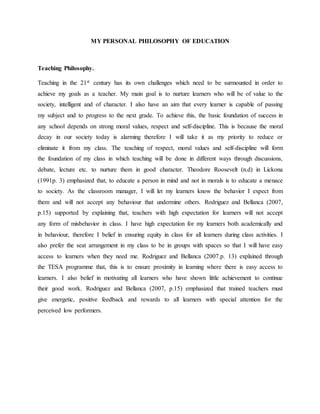
MY PERSONAL PHILOSOPHY OF EDUCATION
- 1. MY PERSONAL PHILOSOPHY OF EDUCATION Teaching Philosophy. Teaching in the 21st century has its own challenges which need to be surmounted in order to achieve my goals as a teacher. My main goal is to nurture learners who will be of value to the society, intelligent and of character. I also have an aim that every learner is capable of passing my subject and to progress to the next grade. To achieve this, the basic foundation of success in any school depends on strong moral values, respect and self-discipline. This is because the moral decay in our society today is alarming therefore I will take it as my priority to reduce or eliminate it from my class. The teaching of respect, moral values and self-discipline will form the foundation of my class in which teaching will be done in different ways through discussions, debate, lecture etc. to nurture them in good character. Theodore Roosevelt (n.d) in Lickona (1991p. 3) emphasized that, to educate a person in mind and not in morals is to educate a menace to society. As the classroom manager, I will let my learners know the behavior I expect from them and will not accept any behaviour that undermine others. Rodriguez and Bellanca (2007, p.15) supported by explaining that, teachers with high expectation for learners will not accept any form of misbehavior in class. I have high expectation for my learners both academically and in behaviour, therefore I belief in ensuring equity in class for all learners during class activities. I also prefer the seat arrangement in my class to be in groups with spaces so that I will have easy access to learners when they need me. Rodriguez and Bellanca (2007.p. 13) explained through the TESA programme that, this is to ensure proximity in learning where there is easy access to learners. I also belief in motivating all learners who have shown little achievement to continue their good work. Rodriguez and Bellanca (2007, p.15) emphasized that trained teachers must give energetic, positive feedback and rewards to all learners with special attention for the perceived low performers.
- 2. Co-operative learning activity by my students. Learning Due to the high expectation from my learners, I prefer the use of learner- centered approach to learning which includes the use of cooperative learning, project-based learning, discovery learning especially in learning science which involves experimental activities and differentiated learning. I belief in empowering my learners to discuss and share ideas together to come up with intelligent and innovative ideas or solutions. This also enables me to give individual attention according to their strength ,Lickona (1991,p.187) supported it by stating that cooperative learning improves academic achievement, self-esteem and attitude towards school for both high- and low-ability learners. I instill in my learners that, I belief in them and motivate them to have the attitude that” I can do”. I regard social interactions with my learners as the channel to break any barriers inhibiting their learning. I have good relations with them, showing respect and love which is supported by Lickona (1991, p.75) that, without rapport, a teacher’s moral influence is greatly diminished. Majority of learners are also affected by emotional issues which affect their academic work. Jensen (2007, p. 18-19) confirms that the mind and emotions are not separate, emotions, thinking and learning are all linked, It drives attention and create meaning.
- 3. My students performing practical activities in groups Meeting the Needs of all learners To develop critical thinkers and creativity in learners, the multiple intelligence of my learners is considered and because majority of them are visual and auditory learners, I allow learning in groups by use of PowerPoint presentation of the content to cover. CD’S and Videos of the lesson are watched by learners and time is given to them to share ideas to prepare them for any form of assessment. Learners become intrinsically motivated by working on their own whiles mediating, facilitating and guiding them through lessons. Different learning methods are used based on the content of lesson. Jensen (2005, p.117) explained that by varying the learning resources available and by providing access to information or tools gives learners the way to construct their own ideas, skills and knowledge. Important issues in Education. I am a teacher who accepts the idea of zero tolerance in schools and classroom when referring to illegal drugs, alcohol use and weapons. I also belief that the only solution to ensure discipline at school and education, is having a better educational interventions to prevent the incidence of
- 4. weapons and drugs on school campus. Skiba (2014) emphasized the shift from being punitive and destructive to learners’ life. I belief in taking more corrective measures in changing the learner to be a good person who can add value to the society. I belief in talking more with my learners to prevent the incidence of drug use where in some cases, resource personnel in counselling would be invited to assist. Finally, I see myself as a teacher who is a mediator, facilitator, motivator, mentor and role model to my learners and to make a greater positive influence in the life of the 21st century learner whom I have high expectation for them to achieve to greater heights in the educational ladder. Reference Lickona, T. (1991).Educating for character: How our schools can teach respect and responsibility. (pp.3, 75, 187) New York, N.Y: Bantam Books. Jensen, E. (2005). Teaching with the brain in mind. (2nd Ed.).(pp.18-19,117) Alexandria, VA: ASCD Rodriguez, E.R. & Bellanca (2007).What is it about me you can’t teach? An instructional guide for the urban educator. (2nd Ed). (pp.13-15) Thousand Oaks, California. Corwin Press. Skiba, R. (2014). Beyond zero tolerance: Achieving a balance in school discipline. Retrieved from: www.edutopia.org/blog/zero-tolerance-US-balanced-school- discipline-russ-skiba